« Jake Johnson: The Cinematographer Intv. B-Sides »
 Saturday, November 30, 2013 at 2:28PM
Saturday, November 30, 2013 at 2:28PM I'd been meaning to post this Jake & Gilbert article from TWS's May 2012 issue for a while. I was talking to Adrian Adrid at Stoner the other day and while we were both fanning out on Jake Johnson (I also fan out on Adrian's frontside ollie in the link above), he mentioned Jake's interview from this so I figured I would post the scans of the mag version along with his full uncut text (Jake's got cut down about 600 words for the final print version. Gilbert's ran uncut.) With everything that the Workshop has been through since this came out I figured both these guys had only grown more relevant. Photos: O'Meally, Chami, Allan. —ME
Original Intro:
Sharing the second half of the last part of The Cinematographer Project—Alien Workshop’s heavy hitting duo—Jake Johnson and Gilbert Crocket both earned their professional stripes this past February the second their footage hit the screen at the 14th Annual TWS Awards in Hollywood. In addition to sharing “Going Pro” parts in Cinematographer redux, both rookies also originated and more or less reside and handle their business on the East Coast. Based in Pittsburg and Richmond respectively—both also seem content to operate outside the confines of the pastime’s standard designated urban playing fields—be they in California or even NY and Philly. Given Alien Workshop’s history of placing itself both geographically (Ohio) and conceptually (See any AWS video) outside the beaten path of the skateboard industry, we thought it would be appropriate to get both their takes on what it means to have your name on a skateboard in this last year of our Mayan lord, 2012. Is moving west still the time-tested prerequisite it once was? Or has the onslaught of Internet interconnectivity finally leveled the entire playing field? Is real street skating on the verge of a massive comeback, or are we unwittingly witnessing its death knell. Peppered with a host of tangent musings—from skydiving to OCD infused alcoholism—the following 10 questions each sought to answer these existential queries along with anything else that popped up along the way.
JAKE JOHNSON:
What happened with this skydiving situation? Was that your first time jumping out of a plane?
Yeah. It was. Crazy. I had been thinking about it for a long time and our first destination was Vegas. We met the dude that trained Bob Burnquist back in 2003. I figured if it worked for Bob. It was unbelievable though. Not only while we did it, but the whole rest of the day while we were skating we were just super confidant and not worried about anything (Laughs).
Are you still living in Pittsburg?
I’m still technically living there. But I’ve been away for like a month and a half.
What is the Map Masquerade tour?
Basically I bought a van that we’re taking on this tour across the country. You can follow us @MapMasquerade or go to asenseofdirection.org. It’s like a mini Workshop van and we have a bunch of friends along. We’re hiding all types of product along the way so you can follow the clues and find the treasure. It’s a conversion van too so I’m planning on living in this thing when I get out to San Francisco. It’s got a nice little bed in there and I have homies along the way to get showers and Internet and all that.
I was reading something about you saying the message of skateboarding was kind of stronger in the small town scenes and videos now? Is that something you seek out? Is that what this tour is about?
Yeah. Definitely. It’s something that I’m building my beliefs around. I want to do what I can to basically support them. I’m learning as I go in the industry that it’s a very fragile thing. I got dropped from Quicksilver last year after putting in all types of time and effort into trying to help legitimize the company. I’m realizing that I got to benefit from the money and support of those companies but in the end, my career is probably gonna last through the support from the core shops and the people who put their life and entire body, energy, and mind into skateboarding. Longevity’s not going to come from some board of trustees. For me, I’m just trying to go at it from the ground up. I want to see skateboarding grow for everybody and filter into our society, but not in a diluted way. I want to see skateparks and skateboarding everywhere but I want to see it done the right way. I think skateboarders have a lot more to offer than just entertaining people. I think we can innovate in a lot of ways.
I guess the million-dollar question then is what the actual message of skateboarding is then, right?
Yeah. I think it really comes from your experiences that you have in the act of skateboarding. They idea is that it develops along the way. That’s what I meant when I was talking about the message carried by the first generation of skateboarders. What they were representing was something entirely outside what society had ever seen, so it was a very destructive force in the beginning because it ran into so much opposition.
What does real street skating have to do with the message?
Basically, what skateboarders were trying to say was that nobody really owns property. We all kind of share it. You take a piece of granite out of the earth and make it into something to sit on, and it makes your business money—but you don’t actually own that rock. I think the message of skateboarders is that nobody owns any of it. When you use it, you become a part of it. You heighten your sense of awareness to reality. And that’s what gives skateboarders their leg up and an advantage. That’s what should give skateboarders their motivation.
So the act itself sort of gives you the message?
Exactly. But nowadays, it’s turning from that into more of a competitive thing, where skateboarders are trying to do it to impress an online community, or to impress a board of trustees. Skateboarding is an intimate relationship with your reality through challenging yourself to face the nature of it. To take a piece of wood and to go against gravity. Go against society. Go against what they define the uses of public space to be. The conclusions that you come to through your trials and tribulations along the way—security, and people that want to stop us—if you learn to maneuver around them more smoothly then we become more efficient beings and basically are evolving. That’s the message of skateboarding. It’s about bettering yourself through the act of riding one.
Wow. It also seems like the same guy that wants to own the granite rock also now wants to own skateboarding, No?
Yeah. Exactly. They want to own it and regulate it. They don’t know it, but deep down they are afraid of our evolution.
I think kids see it though, even without understanding…when they see the real thing they know it, like—I want that.
Yeah. They feel it. I hope that they can still experience it the way they should. It’s gonna get harder and harder though. Bigger companies will stretch skateboarding further and further. I think a lot of people argue that basically as long as more people are seeing it it’s good. I think that’s false. I think it should be more of a less is more type situation. There should be more focus on less people. You can get a message out to all kinds of people, but they’re not going to make informed decisions unless they really understand that message. It might work in the short term. But in the long run it will come back to bite us. Skateboarding isn’t for everybody.
Beyond solving skateboarding—where you out at the Awards for The Cinematographer Project premiere?
Yeah. I was there. I was hiding in the corner somewhere but I was there.
How was it seeing that in completed form?
It was stressful. I was coming off the worst injury of my life. I put a lot of responsibility on myself when I’m filming. I feel like filming our interpretation of skating is really the only thing we have outside of doing it for ourselves. So it’s really important to me. I’ve had a lot of second thoughts and distrust for HD and the dynamic that goes with filming HD, so it was a tough project, and I really only had three months time to film.
What is the dynamic that goes with HD? What are the limitations to you?
The limitations of just finding a filmer with HD gear is one thing. Because he has to spend an enormous amount of money on it. Then it’s relatively heavy and a very cinematic piece of equipment. So if you’re spending that much money on it, you’re probably wanting to use it for higher end production. So your mentality is already more production based. Your tendency is going to be to stylize your footage. I think HD might cause kids to think there’s this standard they have to meet. It leads to a more planned out and structured approach to filming. They’re not just grabbing the camera and skating with a friend all day long. It takes over the session too much. It’s getting better now. The cameras are getting more affordable. And I watched Benny (Maglinao) do this and I came to respect his style and understand the medium. But I definitely don’t think that the VX is dead.
Do you think that the VX can make a comeback?
I hope so. I hope that I can be at the forefront of it. I’m trying to push that in my skating. I think a lot of people jumped on board the HD because the industry pressured people to do so. But I think there’s still value in the VX footage. Think about the prime of skateboarding in the 90s to 00s was translated to us through the VX. It’s not just nostalgic, but also the quality of the experience. The sound of the audio. The ability to get close into each spot with the fisheye and the Mark 1. It’s the emotion you get when you watch it. These things all made skateboarding the way we wanted. I think HD excludes certain people too by having standards. I still think skateboarding is translated through your own eyes, a filmer, or a photographer. For other people to experience skateboarding they need to have one of those options.
HD tends to feel like something is being presented to you, whereas watching VX feels like you’re there with the skater. Like your one of the dudes in the trenches.
I’ve never heard it referenced like that but that’s exactly how I feel. I feel that HD puts a wall of glass between you and the skater. Like you’re watching something in a museum. Sometimes it just feels like a video game. And that’s where it disconnects me emotionally from the footage. I organized my whole life around skate videos—when they were coming out, what year they were released. My whole childhood was basically framed up by the anticipations and then premieres of these videos. I don’t know what kind of an affect the constant Internet updates will have on the youth. I know a lot of people are becoming keener with it, and they are able to take what they want from it and leave the rest alone. I just personally think it’s important to support people that create full length videos and have something physically come out, even if it takes a little longer. I think skateboarding is about patience. Good skateboarding takes time and you can’t rush it. There’s a lot of pressure now, especially for sponsored skateboarders just to produce. They’re being pulled in all different directions. I think they need to be left to develop their own styles. Each scene should develop their own style rather than all try and conform to the Internet. It’s a wash.
How does going pro feel now? How soon do you and Gilbert get boards?
They congratulated us on going pro after the part premiered at the Awards show. I gave Mike (Hill) some suggestions for graphics though. I gave him this book of really strange architectural structures. I told him to do something with a Geodesic dome or something like that. Hopefully within the next few months we’ll have something out. It still doesn’t feel like it’s happened. I guess that’s the corny, stereotypical answer but it’s true. It’s going to be strange to see my name on there.
Both Gilbert and yourself are from back east. Do you think you still have to move out west to make it?
I think that’s one thing that the Internet is really a positive thing for. That idea that I have to move to California to be seen is almost completely gone, I think. I mean, people still want to move to California. But the idea that you have to be there because the Industry is there has almost died out. I’m on tour with Marc Sucio right now, he’s from California so it doesn’t apply on that angle but you look at the following he got from putting out one part on the Internet.
My generation was right on the border of the Internet. I got on Instant Messenger in 1998. I’d meet kids at Camp Woodward and then keep in touch with them on there. We’d transfer footage in these primitive ways and I’d meet up with skaters in person when I started taking trips to New York. That’s basically what helped me move to NY. I appreciate that side of the Internet a lot so I know it has its good uses. It’s when kids actually believe they can use the Internet to get famous that things turn ugly. Just skate. People will take notice if you’re good enough.
It seems like The Cinematographer Project kind of followed in the return to real city street skating. Like more dodging cars and rough spots with cool backgrounds and less schoolyard ledge combo stuff. Is that type of skating coming back right now?
I think it is. I think it got to a point technically where there’s not too many people that can really push the boundaries. You have your Nuggets and your Nyjah’s, or Marc Suciu. There’s a small group of people that have the technical ability to still innovate. Then on the big side, it really had already pretty much maxed out in the Jamie Thomas' day. It got to a certain point on both fronts where there’s just that much more you can do. So it starts coming back to style and spot selection. I think people that have interesting approaches to even basic tricks start to be what stands out. The visual experience is what skateboarding is all about. Finding those unique locations that incite ideas and emotions to the viewer—that’s the most important thing there is.
Where do you see people doing it right out there today?
Well, I think it’s really interesting in a business as top heavy as skateboarding, now you are seeing people from other countries that have the same passion for the message and are doing it in their own way. I really enjoy watching companies like Magenta, and Palace, and Polar coming up from various countries in Europe right now. I think it’s rad to see them get a little more stylish and creative then some of the big companies.
What pro would you like to model yourself after? Who carries the message, without starving?
I don’t know. I’ve been following Pontus (Alv) pretty closely for the last few years. I’m not sure what his financial state is but it seems like he lives a good life. He builds all these rad DIY projects and creates all these super unique skate spots and artistic installments. He gets to create his own videos, artwork, board graphics, and do it all from his own country. I would say if I could model myself after anyone, it would probably be Pontus. He takes what he does seriously and he gets to have ultimate control of what he puts out. What could be better? Actually, if I could really do it, I would become a hybrid of Pontus and Heath Kirchart. Heath is another guy that takes his skating seriously. He wants to make sure he helps push the limits of skateboarding. He handles everything on a very professional level. So if I could combine both of those things, that would be it.
I’d pay to see that hybrid.
I want to give skateboarders that sense that you can create your own world. I think that’s really the best thing skateboarding teaches people. I believe in my core that this world is a heaven and a hell. It all just depends on how you live it. What are you doing to create it?
Last question—do you think skydiving’s gotten too mainstream?
(Laughs.) Oh fully. It’s not about the spots anymore. It’s too commercial. They’re all jocks now.
The Cinematographer Project ('12) AWS part. Still so good.

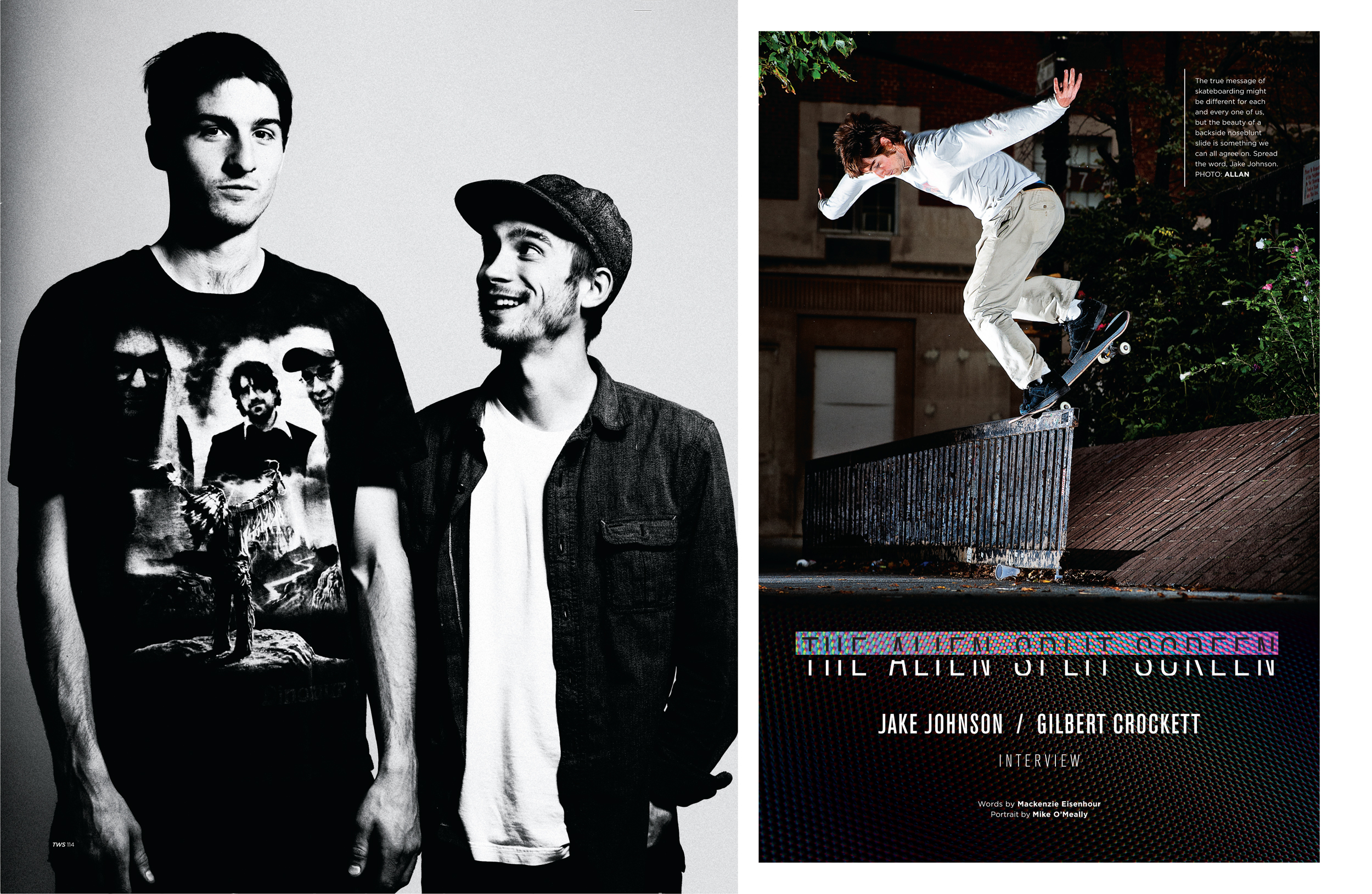
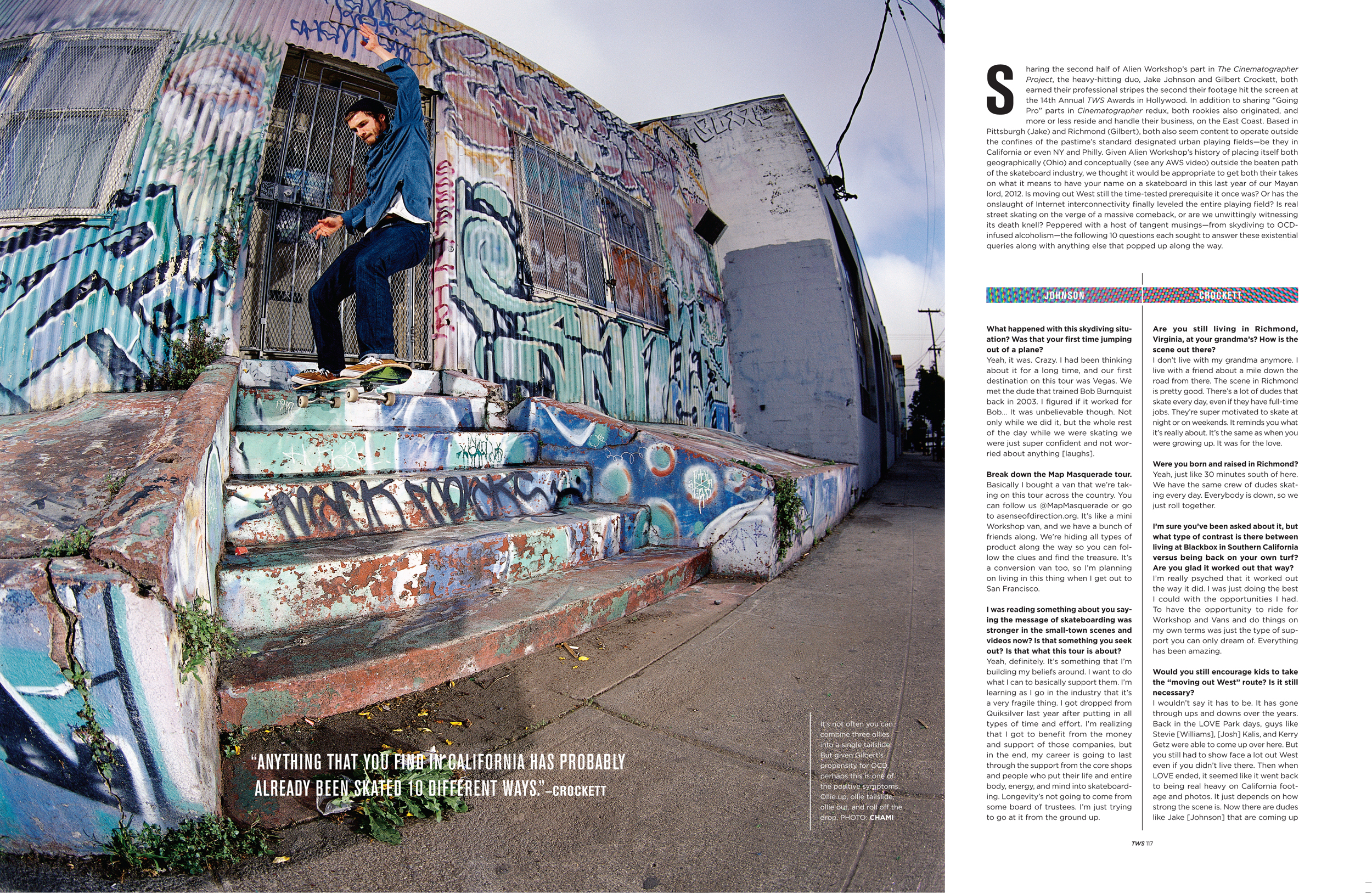
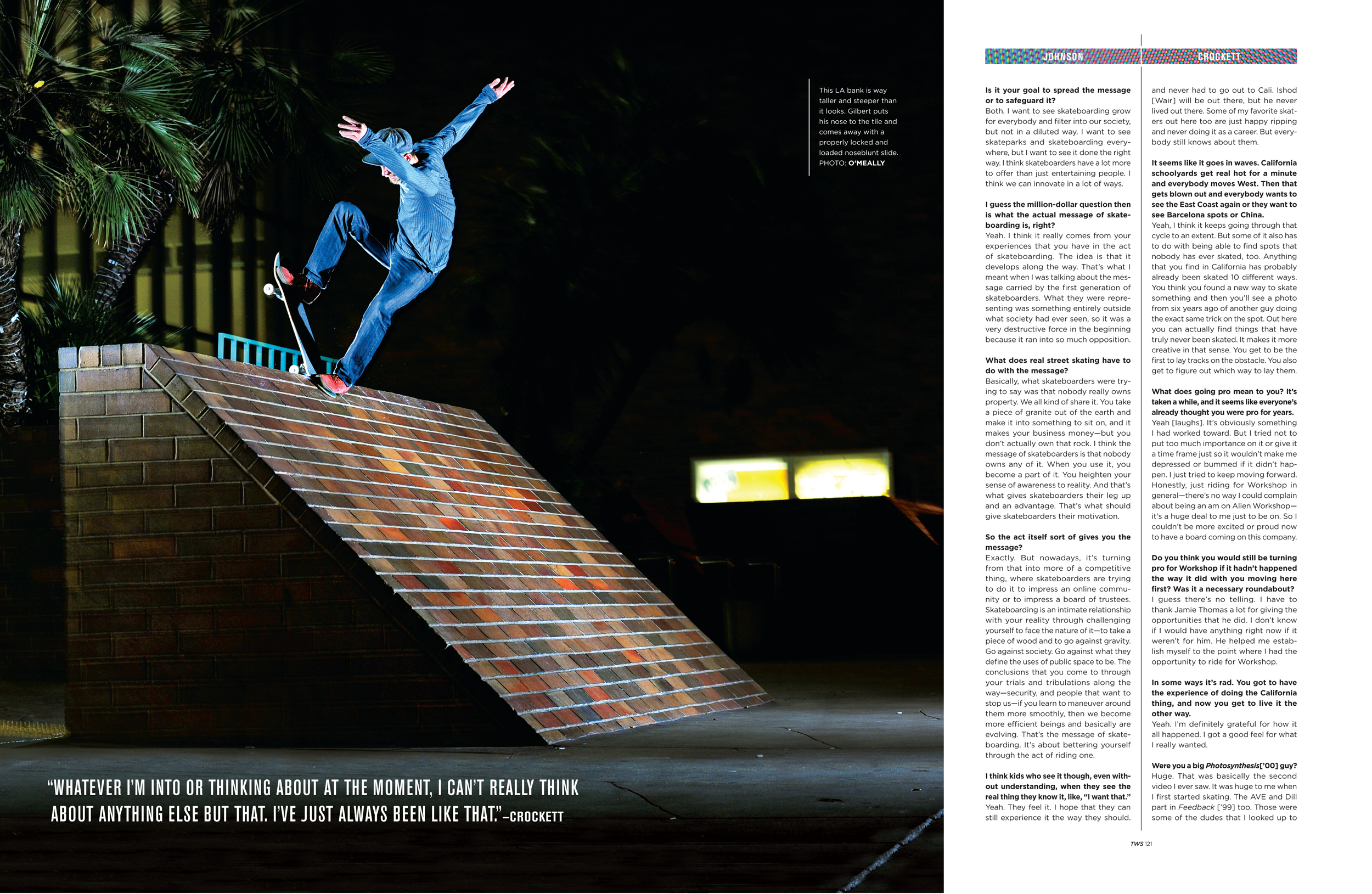
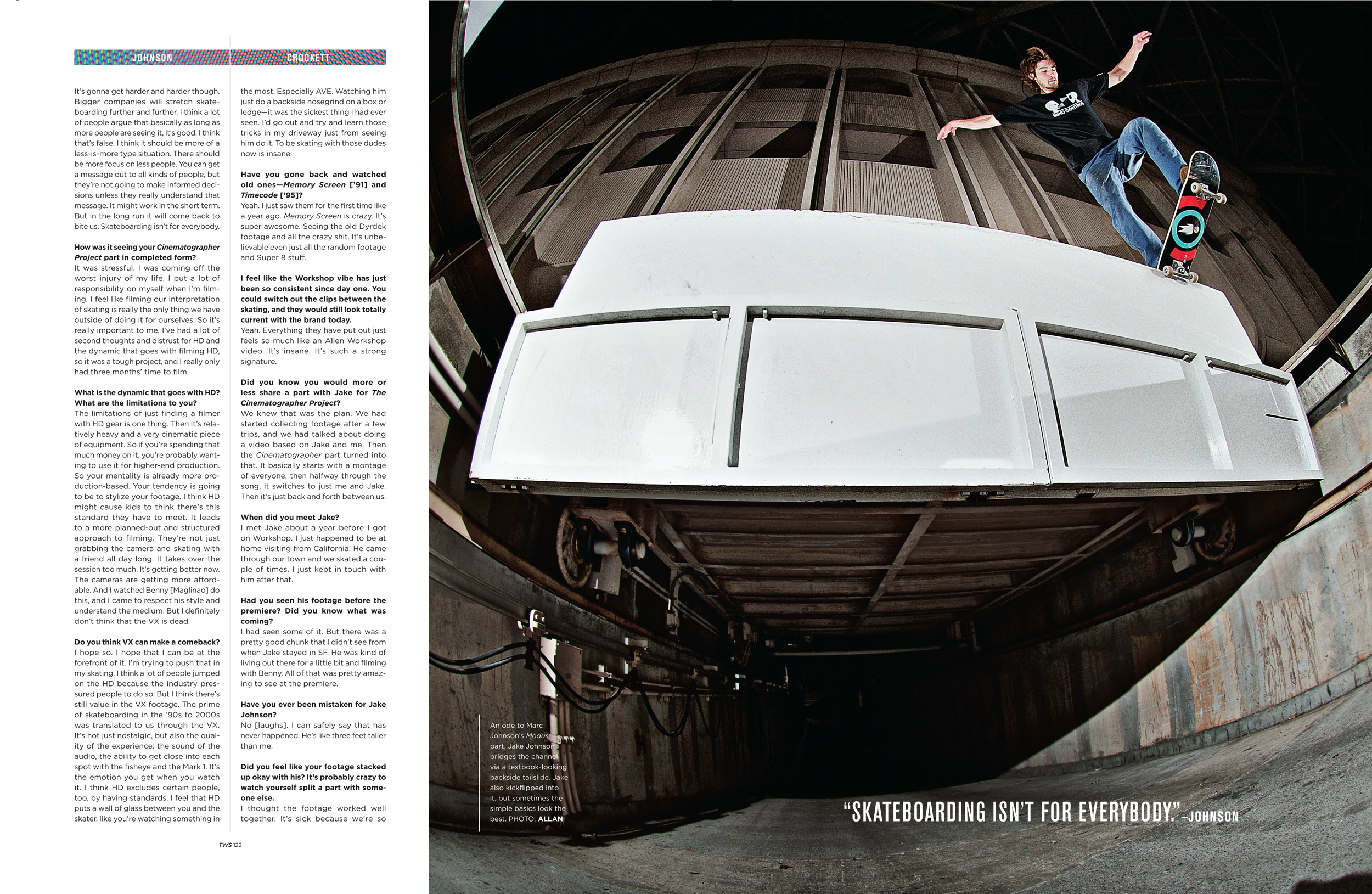
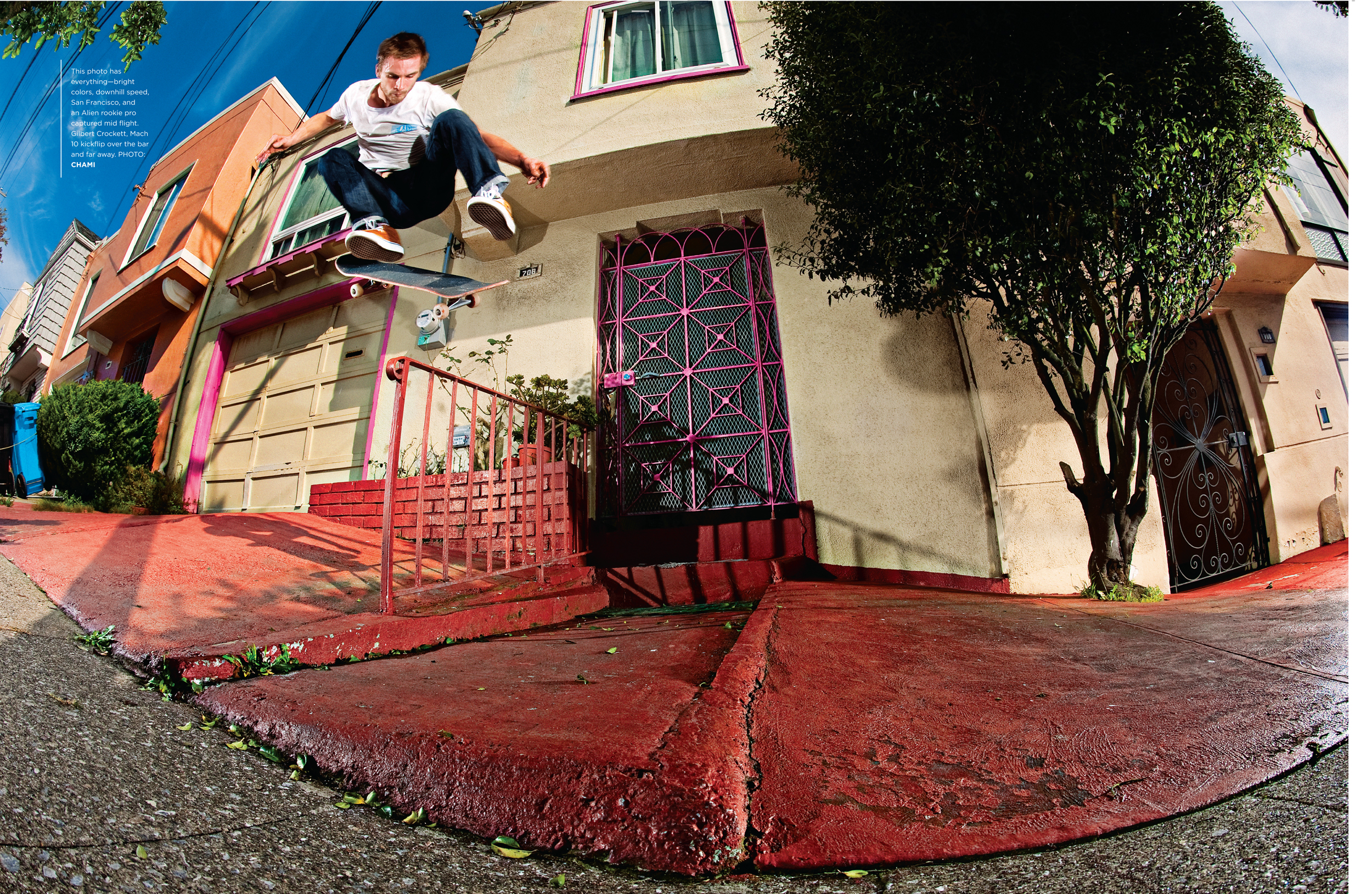
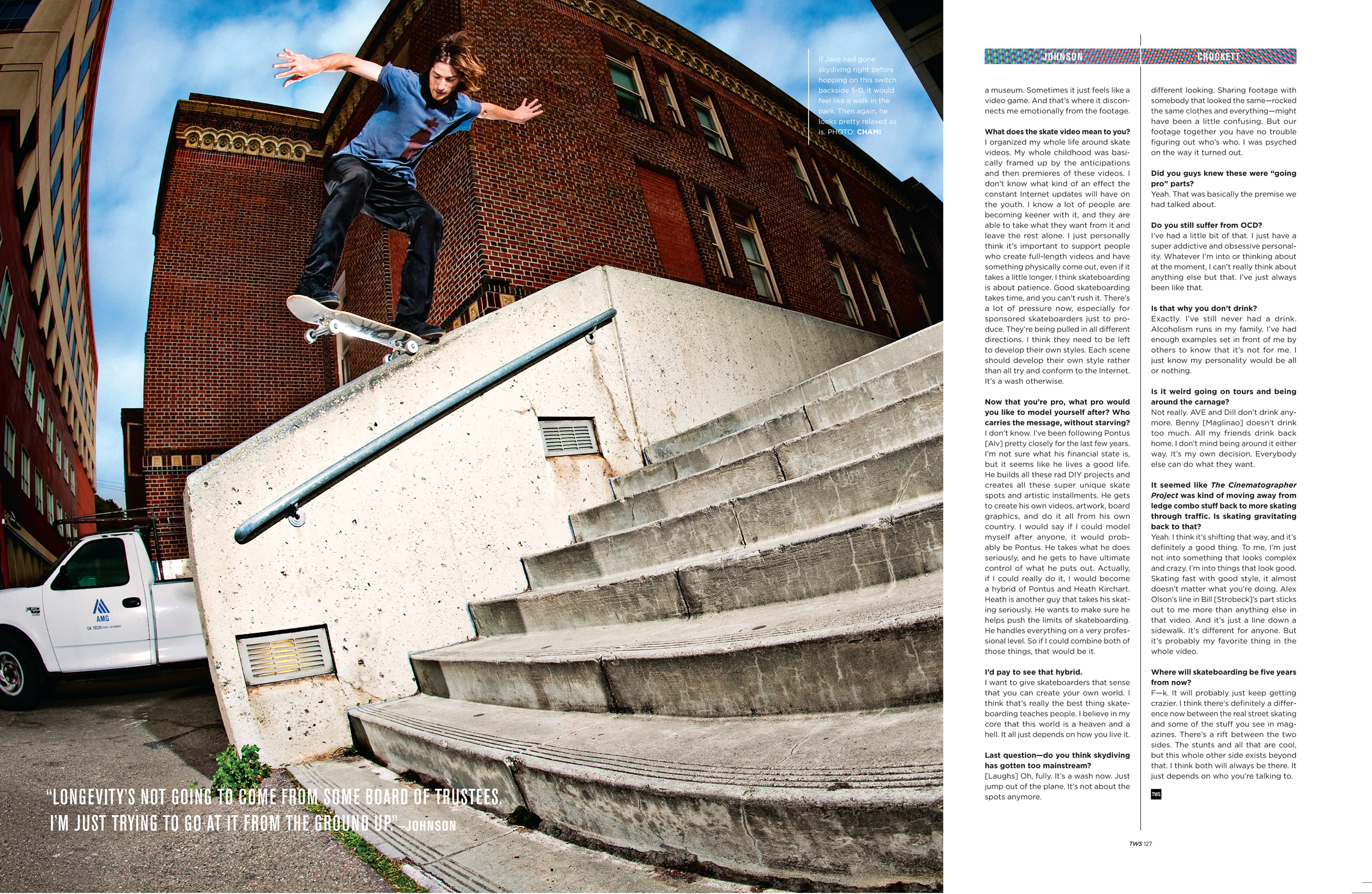
Reader Comments